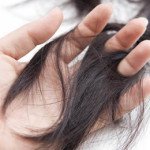Can Eczema (Seborrheic Dermatitis) Cause Hair Loss?
Eczema (people also call it as dermatitis) is a common skin disorder that can make your skin become inflamed. It comes in many different forms and therefore there are several types of this skin disorder. And when it affects the hairy & oily skin (such as inside the ear or even scalp) that can cause hair loss, this type is what we call as seborrheic dermatitis.
As mentioned before, eczema can affect the skin in many forms. But in general, it tends to cause the following symptoms [1]:
- Scaling. The affected skin can flake off, becoming a rough /scaly appearance.
- Itching. All of types can cause itch, even most sufferers say that dealing with the urge of scratching is the most difficult thing during the flare-up.
- Redness is another common symptom. Even the affected skin may appear blotchy & bleed.
- Sometime, fluid-filled blisters may also occur. If left untreated, this problem can be potential to ooze & form crusts.
- And in severe case, a condition called fissures may occur. It is the damaged skin that can be painful, deep cracks.
How about with seborrheic dermatitis? It can affect many different areas of the body, but mostly it occurs where the skin is greasy /oily such as lips, behind the ears, chest (particularly middle of the chest), in the outer ear, behind ears, eyelids, eyebrows, and scalps of the head – as noted before.
 Generally, if you have seborrheic dermatitis, you will experience some of the following symptoms [2]:
Generally, if you have seborrheic dermatitis, you will experience some of the following symptoms [2]:
- You have lesions on the affected skin.
- Skin scales /dandruff (white & flaking, oily, yellowish, and adherent).
- Itching – the most common symptom of eczema.
- The affected skin can be more oily or greasy than before.
- Redness (especially mild redness, in many cases).
- And hair loss. This symptom can be noticed clearly if the affected skin is hairy skin such as the scalp of the head and eyebrows.
In other words, this kind of eczema can trigger and cause hair loss, particularly true if the affected area is hairy skin.
Currently, there is still no any confirmation about the exact cause of the problem. Some studies are continuously going for the answer. However, there are also some theories.
Some experts theorize that irritation triggered by bacteria called malassezia may be the answer. It may play a key role in some cases of seborrheic dermatitis.
But in general, it may occur because of a combination of different factors, particularly the combination of irritation triggered by malassezia and an over production of skin oil.
The most common type of eczema (atopic dermatitis) can run in families, how about seborrheic dermatitis? Yap, it also appears to run in families.
Other risk factors (factors /conditions that put someone at high risk of having seborrheic dermatitis) include [3]:
- Having oily hair or oily skin, as noted before.
- Having neurological problems such as stroke and Parkinson’s disease.
- Some chronic problems (especially problem of immune system such as HIV ‘Human Immunodeficiency Virus) may also increase the risk.
In addition, lifestyle factors may also have an effect on increasing the risk of developing this kind of eczema. These lifestyle factors include poor skin care (infrequent skin cleansing or shampooing), obesity, fatigue, stress, using lots of alcohol-lotions, or even extremely changes in weather may have an effect.
The treatment approaches are based on the symptoms that appear.
For instance, dryness and flaking can be improved and treated with medicated shampoos /over-the-counter dandruff that you can buy in your local drugstore with /without a prescription. What else?



